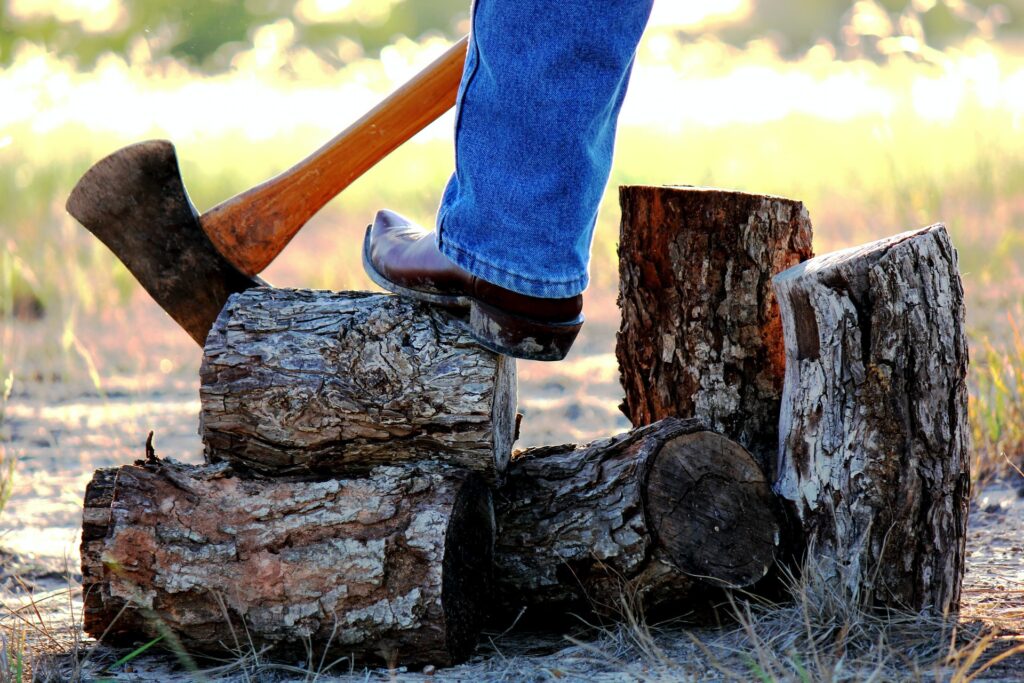
Paul Bunyan sat on the side of the road. By his side was a rusted axe and an absence of Babe. He held in his hand a large rectangular sign, a former billboard he borrowed for his purposes. In black paint the sign read: Seeking Employment.
Work had been hard to get these past decades. A lot had changed since the West was free and carriages roamed. His skills were impressive – but, in this day and age, unnecessary. The speed of the saw blade was efficient enough for the world, and machines were much cheaper to feed than he was.
True, he could still cleave through a whole forest in one mere swipe of his axe, but there was so little space for that anymore. If he wasn’t careful, he could risk knocking over a cell tower or crushing a cabin or dislodging a parking lot. It has happened before, and, he could tell you, the folks down there were less than pleased.
Even when he had the space to show off his impressive strength on a lonesome part of the forest in the Amazon, he wasn’t able to take a swing. Several trucks rolled up below his feet – the EPA and their forces. They promptly ordered him to cease and desist or face prosecution. Bunyan had no choice but to trudge back home, his arm aching from underuse.
Nothing, however, was as hard for Bunyan as the press was. As studies were done and reports were made over the scope of Bunyan’s impact on the environment, he became something of a controversial figure. Historians and scientists and conservationists alike began to demonize Bunyan as the bane of the American wilderness; the destroyer of countless habitats. It was because of Bunyan the Buffalo are so rare, because of Bunyan that the Californian Golden Bear is now no-more, because of Bunyan that hundreds of species are disappearing from the earth. Bunyan was worse than poachers, worse than pollution, than Exxon and BP. And eventually Bunyan couldn’t step anywhere without his foot being crowded by reporters who wanted to know his response to these accusations – though they were hardly interested in his side.
A lawsuit was eventually held against Paul for his alleged crimes against nature. The People Vs. Paul Bunyan was the story of the month – all the best news channels reported on it. Protestors and debaters and the curious masses all crowded around the courthouse for the days the trial went on. The Anti-Bunyan side stood on the left, shouting statistics and brandishing damning symbols. Those who were Pro-Bunyan stood on the right, proclaiming that he was an American icon being unjustly persecuted just because he was no longer appropriate. On both sides stood advertisements for International Paper, which celebrated itself as an ecologically conscious company.
Bunyan tried his best to defend himself. He remained calm and friendly though the course of the trial, and spoke as plainly as he could. But his weathered tales of wilderness heroics and ambitious settlers could not save him from the sharp-edged comments of the attorneys, which, in tandem with carefully chosen experts, skinned the giant like a bear in front of the judge. It was by a miracle that he was declared not entirely guilty for the damage. He was, however, required to pay a sum of money as large as he was – an amount in the hundred millions.
It was needless to say that Bunyan could not pay back his debts. He had been without employment in recent decades, and a week’s grocery bill for him was enough to bankrupt a small business. It took only a month for him to lose his home, his ox, and most of his flannel shirts. The edge of the road became his sole domain, and the occasional look of pity became his only sustenance.
They say he still sits there today. Still holding his sign, hoping for employment. His beard has grown long, they say. His flannel is ragged and his axe is nothing but a brown wedge. The hearty meat on his bones has withered so much, they say he looks as thin as one of the sapling trees newly planted in the forests he used to romp in. His good humor is gone. The once-boisterous giant has grown bitter with age and delirious with hunger. He rambles, endlessly like he used to, about the days of the frontier. “The world was bigger back then.”, says. “Now? Now I can’t walk anywhere.”
He shrinks by the day. Little by little his back curls outward and his head hangs lower like a lamp fixture. His eyes grow dimmer like the end of a sunset, and his red-apple cheeks sag with mourn. Soon, they say, he may dwindle into no-one. Yet he waits, patient and dying for his chance to swing again, believing, perhaps hopelessly, that there would be a corner of the globe still open for giants.
Be First to Comment